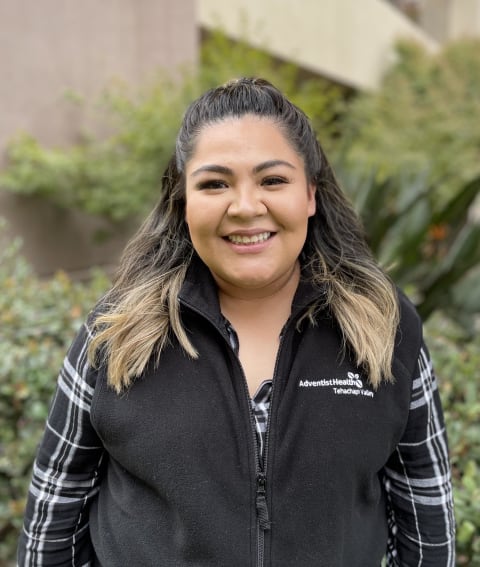
The Path to Restoration
Story 61
By Kirsten Cutler
How can a hospital best serve its neighbors – including those who have no place to call home? Perhaps it begins with offering help that restores as well as heals.
California leads the country in the number of people experiencing homeless, and annual counts that carefully track these numbers reveal a steadily worsening problem. Kern County, which covers an area of about 8,000 square miles northwest of Los Angeles, follows the trend. The area is also home to three Adventist Health hospitals that, this year, launched a program to make a difference.


A new grant issued to Adventist Health’s Kern County hospitals is funding a program to connect patients who are at risk for homelessness with prevention services and work toward the goal of helping them achieve long-term stability.
Erika Martinez is pioneering the role of Homeless Care Access Coordinator for Adventist Health Bakersfield and has lived in Kern County for most of her life. Her deep passion for helping her community led Erika to the opportunity, in which she connects with patients during emergency department and inpatient visits with the goal of restoring them to safe, stable living situations.
“It’s difficult to put into words the feeling one gets when you see someone who has experienced homelessness at the most fragile point in their lives, and then see them holding the keys to a safe place to live and knowing that their new life will begin,” she says.
In addition to connecting homeless patients with shelter, Adventist Health works to set them up with access to other resources and services like nutritious food and primary care.
“When someone is ill and doesn't have a place to stay and heal, we’re able to take one more burden off their hands so that they can concentrate on what is important – their well-being,” Erika shares. “I find deep satisfaction in that.”
"We’re able to take one more burden off their hands so that they can concentrate on what is important – their well-being.”

Erika uses a screening tool to determine patients who are most vulnerable and most likely to continue to face poor health outcomes if remaining in their living situation. She connects each patient as swiftly as possible to emergency shelter and, whenever possible, long-term housing. To do this, Erika works directly with medical staff, local service providers, and programs such as the Bakersfield Homeless Center’s Rapid-Rehousing Program.
“What sets Erica's role apart is she is meeting people in their most vulnerable state of homelessness and illness,” says Josh Pierce, Director of Community Integration for Adventist Health Bakersfield and Tehachapi Valley. “She is helping to make sure each person has a safe place to go when they’re discharged, and it’s not just having a safe place to go for one night. The solution needs to be long-term. Really, the end goal is, ‘How do we restore people's lives?’”
"Really, the end goal is, ‘How do we restore people's lives?’”
On average, about 1,700 hospital visits at Adventist Health Bakersfield each year are by people experiencing homelessness. Earlier this year, the Bakersfield-Kern Regional Homeless Collaborative identified 2,150 people experiencing homelessness in the area.
In addition to serving the needs of unhoused patients, Adventist Health’s homelessness prevention program in Kern County will be able to assess health conditions and diagnoses affecting the local homeless population in order to strategize ways to improve health and safety for people who are homeless, as well as the entire community. As the program grows, Adventist Health’s goal is to replicate the model at other hospitals throughout the West Coast.
Related stories

Todd Reese

Mark Mitchelson

Milad Pezeshki

Somos | "We Are"

Sarah Gutierrez

Cory Ferrier

Central Coast Service Area | Celebration Event

Mara Bryant

Camie Overton

Jayant Eldurkar

Terry Johnsson

Nursing Chose Me

Jayme Mason

Patrick Takahashi

Home again at Adventist Health White Memorial Montebello

Sarah Shelbourne

Jenny Lavers

Shane Cox

Kiyoshi Tomono
